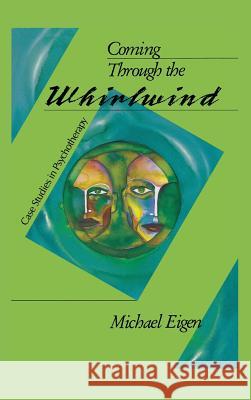Coming Through the Whirlwind: Case Studies in Psychotherapy » książka
Coming Through the Whirlwind: Case Studies in Psychotherapy
ISBN-13: 9781888602937 / Angielski / Twarda / 2013 / 274 str.
The pain and rewards of depth therapy revealed in two case studies.Michael Eigen, Ph.D., author of The Psychotic Core and The Electrical Tightrope, is a senior member, Board of Directors, and control/training analyst at the National Psychological Association for Psychoanalysis; Associate Clinical Professor, New York University Postdoctoral Program in Psychoanalysis; faculty and supervisor, Institute for Expressive Analysis and New Hope Guild. In essence, Eigen's book gives witness to a central issue of Aeschylus--we suffer into knowledge--and shows how it is embodied and animated on the stage of the clinical setting with its two throbbing props, couch and chair.
- Patrick J. Mahony, author of Freud as a Writer
No other psychoanalyst writing today can command this repertoire of tones and voices. To read Eigen is to experience the moment-by-moment changes of heart that for him constitute the analytic encounter. The shrewd eloquente, the cunning sympathy and humor at work in this book are unique in psychoanalysis. lt should be celebrated with the paradoxes it is inspired by.
- Adam Phillips, Author of Winnicott
Eigen shares two cases: a woman who manifested spirituality to the exclusion of facing hovering psychological problems, and a man whose virtual obsession with psychological "truths" led him to omit spiritual development. This book will be of interest not only to therapists but to all who are interested in the spiritual in human life.
- Jean Sanville, Editor of Clinical Social Work Journal and author of The Playground of Psychoanalytic Therapy.
The pain and rewards of depth therapy revealed in two case studies.Michael Eigen, Ph.D., author of The Psychotic Core and The Electrical Tightrope, is a senior member, Board of Directors, and control/training analyst at the National Psychological Association for Psychoanalysis; Associate Clinical Professor, New York University Postdoctoral Program in Psychoanalysis; faculty and supervisor, Institute for Expressive Analysis and New Hope Guild. In essence, Eigen's book gives witness to a central issue of Aeschylus—we suffer into knowledge—and shows how it is embodied and animated on the stage of the clinical setting with its two throbbing props, couch and chair.
- Patrick J. Mahony, author of Freud as a Writer
No other psychoanalyst writing today can command this repertoire of tones and voices. To read Eigen is to experience the moment-by-moment changes of heart that for him constitute the analytic encounter. The shrewd eloquente, the cunning sympathy and humor at work in this book are unique in psychoanalysis. lt should be celebrated with the paradoxes it is inspired by.
- Adam Phillips, Author of Winnicott
Eigen shares two cases: a woman who manifested spirituality to the exclusion of facing hovering psychological problems, and a man whose virtual obsession with psychological “truths” led him to omit spiritual development. This book will be of interest not only to therapists but to all who are interested in the spiritual in human life.
- Jean Sanville, Editor of Clinical Social Work Journal and author of The Playground of Psychoanalytic Therapy.











